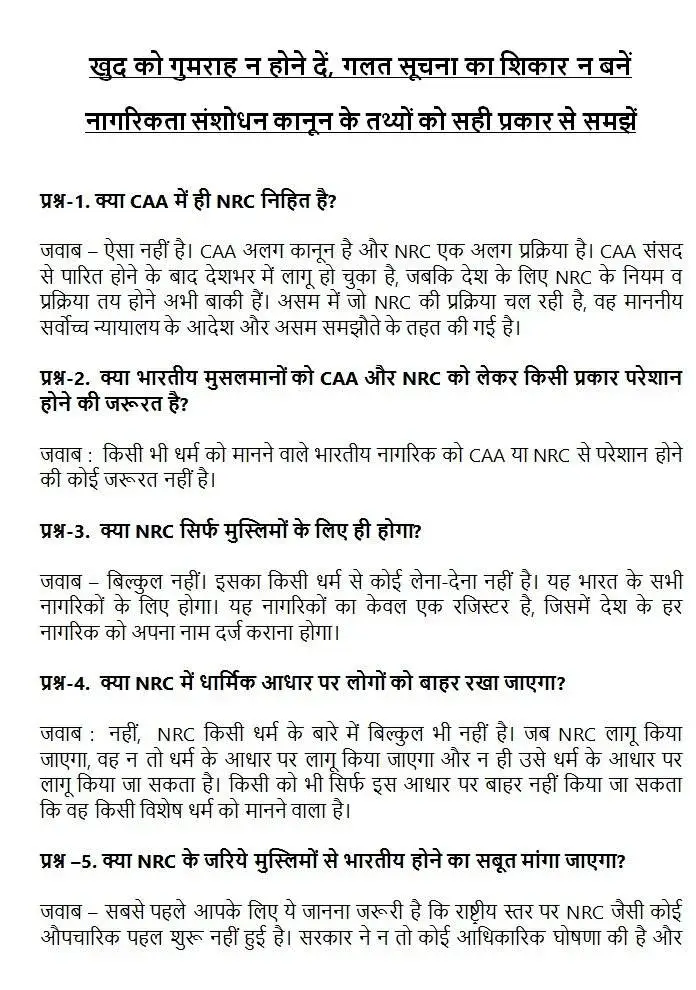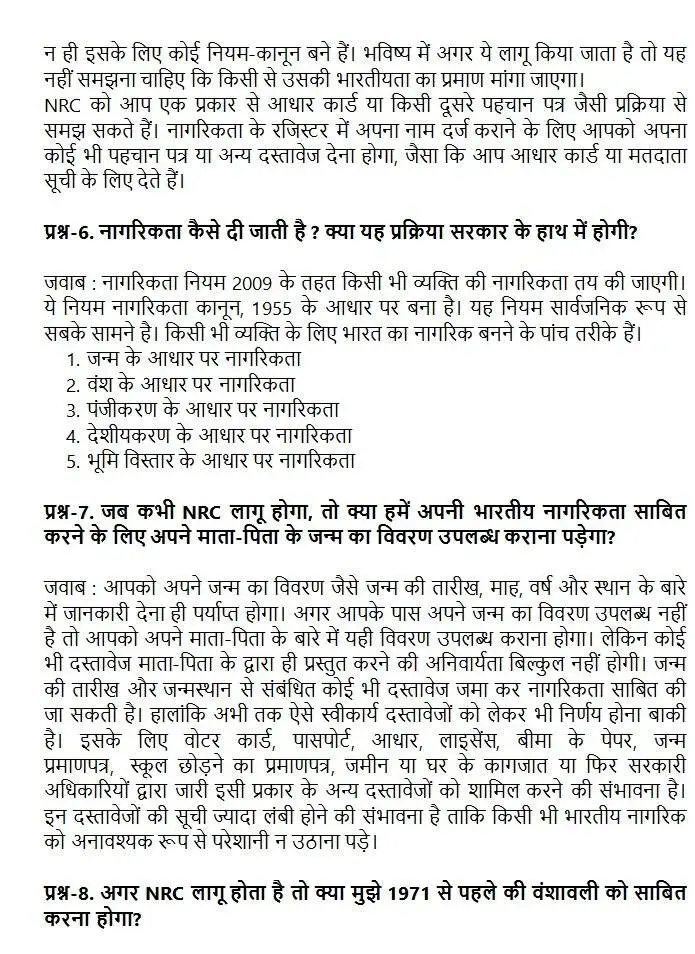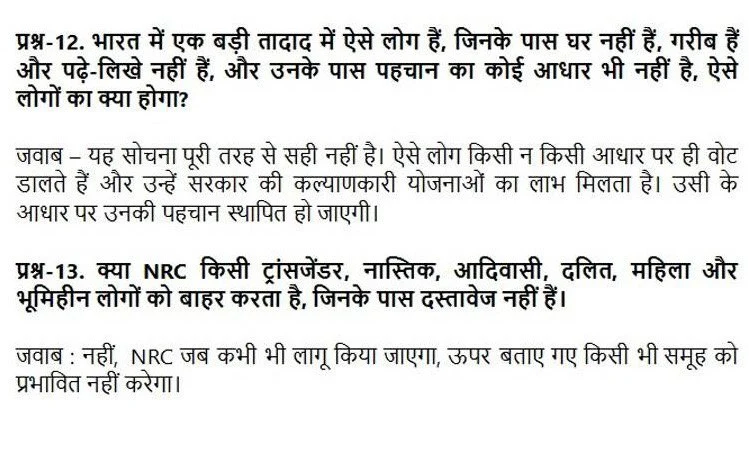On Monday, March 11, 2024, the Central Government officially put into effect the Citizenship Amendment Act (CAA), marking the implementation of the legislation five years after its passage in Parliament. Enacted by the Indian Parliament on December 11, 2019, the Citizenship (Amendment) Act amended the 1955 Citizenship Act, expediting the process of Indian citizenship for persecuted religious minorities from Afghanistan, Bangladesh, and Pakistan who entered India by 2014. This specifically includes Hindus, Sikhs, Buddhists, Jains, Parsis, and Christians. It’s crucial to emphasize that Muslims are excluded from the law, as they constitute the majority in the aforementioned neighboring countries.
In 2019, following the passage of the Citizenship Amendment Act (CAA) in the Indian Parliament, New Delhi experienced protests and subsequent riots. The tumultuous aftermath was fueled by a toxic mix of misinformation, distorted narratives, and propaganda targeted at certain sections of the Indian Muslim population during the chilly winter of 2019. The architects of this misinformation included both Indian and foreign left-liberal media outlets such as the New York Times, Washington Post, and BBC, along with media sympathetic to terrorist elements- Al Jazeera. However, in light of the recent decision to implement the CAA, media entities like Al Jazeera are once again poised to propagate a distorted narrative, potentially aiming to incite unrest in India.
Al Jazeera and other Islamist entities are swiftly engaging in sharing fear-mongering narratives among Indian Muslims. Here is a tweet from the Qatar-based Al Jazeera, Kerala Chief Minister Pinarayi Vijayan and the fervent radical Islamist Shadab Chauhan.
BREAKING: India implements ‘anti-Muslim’ 2019 citizenship law weeks before election https://t.co/3xncL9QZGt pic.twitter.com/HxPfrm4zH3
— Al Jazeera English (@AJEnglish) March 11, 2024

Inshaallah we will oppose CAA constructionally and democratically.
— Shadab Chauhan شاداب چوہان (@shadab_chouhan1) March 11, 2024
We already file a pil in supreme Court against this black law.
This article will shed light on two key aspects of the Citizenship Amendment Act (CAA). Firstly, it will provide an overview of the CAA. Secondly, it will address the significant assurance that Indian Muslims, both within the country and abroad, need not harbor concerns about the implications of the law.
What is CAA?
This law, known as the Citizenship (Amendment) Act, 2019, becomes effective as determined by the Central Government. In the Citizenship Act of 1955, a new provision is added in section 2, stating that individuals from Hindu, Sikh, Buddhist, Jain, Parsi, or Christian communities in Afghanistan, Bangladesh, or Pakistan, who entered India before December 31, 2014, and have been exempted by the Central Government under certain conditions, will not be considered illegal migrants under this Act.
In the exercise of the authority conferred by section 18 of the Citizenship Act, 1955, the Central Government has introduced new rules to amend the Citizenship Rules, 2009. These rules, titled the Citizenship (Amendment) Rules, 2024, have been implemented with effect from the date of their publication in the Official Gazette (11 March 2024).
Rule 10A has been added to the Citizenship Rules, 2009, after the existing rule 10. This new rule outlines the application process for individuals eligible under section 6B for the grant of citizenship by registration or naturalization. It specifies that applications must adhere to certain formats based on the eligibility criteria, such as being a person of Indian origin, married to an Indian citizen, a minor child of an Indian citizen, or meeting other specified conditions.
Furthermore, Rule 11A introduces the authority to which applications under section 6B can be submitted. It mandates that applications be made electronically to the Empowered Committee through the District Level Committee, as notified by the Central Government. The District Level Committee is responsible for verifying submitted documents and administering the oath of allegiance.
Rule 13A empowers the Empowered Committee to scrutinize applications under section 6B to ensure completeness and conformity to the stipulated conditions. Upon thorough inquiry and satisfaction, the Empowered Committee may grant citizenship to the applicant.
Additionally, new sub-rules (2A), (2B), and (2C) have been inserted after Rule 14(2), outlining the issuance of a digital certificate of registration to those registered as citizens under section 6B. Similar provisions have been added for individuals who acquire citizenship by naturalization under section 6B in sub-rules (1A), (1B), and (1C) after Rule 15(1).
Rule 17 has been amended to include references to section 6B alongside section 5, acknowledging the multiple avenues through which citizenship can be acquired.
Lastly, a new sub-rule (3) has been added after Rule 38(2), emphasizing the requirement for the oath of allegiance in applications submitted under section 6B to be signed in the presence of, or administered by, the Designated Officer as specified in Rule 11A.
Alongside these rule changes, new forms, including Form IIA, have been introduced to facilitate the application process for citizenship under section 6B. Form IIA is specifically designed for individuals applying for registration as a citizen of India under this section, adhering to the prescribed conditions.

Prior to the Citizenship Amendment Act (CAA), according to Article 6 of the Constitution, migrants from Pakistan, which now includes Bangladesh, were eligible for Indian citizenship if they entered the country before July 19, 1948. In Assam, where significant migration occurred from East Pakistan (later Bangladesh), migrants could obtain citizenship if they arrived in the state before the 1971 date specified in the Assam Accord.
The Citizenship Act of 1955 outlines four pathways to acquiring Indian citizenship.
1- Citizenship by Birth: Initially, the law in 1955 granted citizenship by birth to anyone born in India after January 1, 1950. Subsequently, an amendment narrowed this provision to individuals born between January 1, 1950, and January 1, 1987.
Further changes were introduced by the Citizenship Amendment Act in 2003. According to the revised legislation, those born after December 3, 2004, are considered Indian citizens by birth only if one parent is Indian and the other is not an illegal immigrant. If one parent is classified as an illegal immigrant, children born after 2004 must pursue alternative means to acquire Indian citizenship, not solely through birth. The law defines an illegal migrant as a foreigner who either enters the country without valid travel documents, such as a passport and visa, or enters with valid documents but overstays beyond the authorized time period.
2-Citizenship by Descent: Individuals born outside India with at least one Indian parent can attain citizenship if their birth is registered with the Indian consulate within one year.
3-Citizenship by Registration: This category is for individuals connected to an Indian citizen through marriage or ancestry.
4- Citizenship by Naturalisation: Section 6 of the Citizenship Act allows for naturalisation if a person, not an illegal immigrant, has resided in India continuously for 12 months before applying. Additionally, in the 14 years preceding the 12-month period, the individual must have lived in India for at least 11 years (relaxed to five years for certain categories under the new amendment).
Waiver: The central government has the authority to waive conditions if an applicant has made significant contributions to science, philosophy, art, literature, world peace, or human progress. This provision has been utilized in cases like the Dalai Lama and Pakistani singer Adnan Sami’s acquisition of Indian citizenship.
Assurance for Indian Muslims: CAA Poses No Cause for Concern
In 2019, the Prime Minister of India, Narendra Modi himself reassured that both the Citizenship Amendment Act (CAA) and the National Register of Citizens (NRC) are unrelated to Indian Muslims.
Union Minister Jitendra Singh emphatically stated, ‘The Citizenship Amendment Act is not anti-Muslim from any angle, and the misconceptions and apprehensions surrounding the Act are unfounded and motivated.‘
RSS chief Mohan Bhagwat also offered assurance, declaring, ‘No Muslim will face any loss due to CAA.’
Defense Minister Rajnath Singh echoed these sentiments, emphasizing that the CAA, now a law, is not anti-Muslim.
Moreover, Dewan of Ajmer Sharif, Syed Zainul Abedin Ali Khan, clarified the misconceptions about the Citizenship Amendment Act, stating, ‘CAA is to give citizenship but not snatch it. This is not for Indian Muslims; I will speak against it if something goes wrong.‘
Furthermore, Mufti Shahabuddin Razvi, president of All India Muslim Jamaat in Bareilly, emphasized that Indian Muslims have no reason to fear the CAA. After a thorough analysis of the Act’s provisions, Mufti Razvi concluded that the law does not impact Indian Muslims but instead benefits immigrants from Afghanistan, Pakistan, and Bangladesh seeking Indian citizenship.
Additionally, the Chairman of the National Commission for Minorities Syed Ghayorul Hasan Rizvi has asserted that the legislation is not against minorities and Indian Muslims need not fear as they are neither intruders nor refugees. He also said it is expected from the Union government to ensure that Indian Muslims do not face any problem due to the National Register of Citizens (NRC).
In 2019, the Government of India addressed numerous queries concerning the CAA, NRC, and their potential impact on Indian Muslims. For instance, a question inquired, ‘Do Indian Muslims have any reason to be concerned about the CAA and NRC?’ The official response from the Government of India was reassuring, stating that not only Muslims but followers of any religion among Indian citizens do not need to worry about the implications of the CAA or NRC. Below, I will provide all 12 questions for readers to examine.




Crucially, the language of the CAA itself doesn’t implicate Indian Muslims; rather, it focuses on granting citizenship to persecuted minorities from Pakistan, Afghanistan, and Bangladesh. The legislation is designed to provide Indian citizenship to Hindus, Buddhists, Sikhs, Christians, and Parsis, without infringing upon the citizenship of Indian Muslims. The amendment is not to exclude any Indian citizen.
Hence, the Citizenship Amendment Law constitutes a single modification within the framework of the Citizenship Act of 1955. This amendment expedites the citizenship-granting process for religiously persecuted minority communities from Pakistan, Afghanistan, and Bangladesh. Specifically, the CAA extends citizenship to Hindus, Buddhists, Jains, Sikhs, Parsis, and Christians. It is crucial to underscore that the CAA is a non-discriminatory law, considering that the Muslim community holds a majority in the mentioned countries. Furthermore, it is imperative to reiterate that, unequivocally, the CAA will not impact the lives of Indian Muslims. The essence of the CAA is rooted in inclusivity, not exclusion.
| Claim | CAA is anti-Muslim |
| Claimed by | Al-Jazeera and Shadab Chauhan |
| Fact Check | False |
Also Read: Analysis: Was Rahul Gandhi Truly Invited to Deliver Lectures at Cambridge University?









